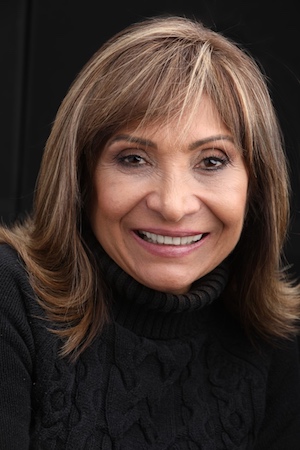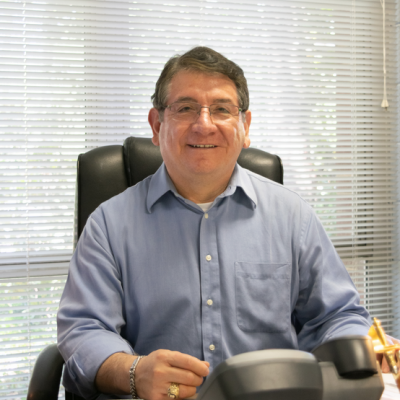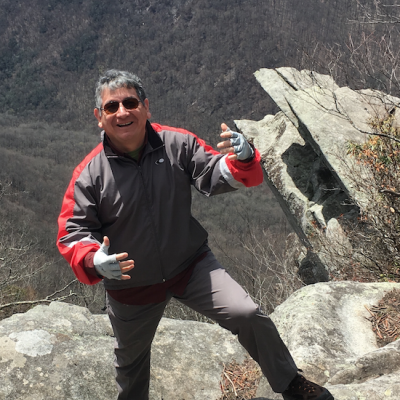Who I Am and What I Am Able to Achieve: Celebrating Hispanic Heritage Month
This National Hispanic Heritage Month, we're highlighting the contributions of outstanding Fulbrighters who live the Fulbright mission through their identities and goals. In this Q&A, Fulbright Scholar Alumni Ambassador Dr. Fausto Sarmiento, and five-time Fulbright Scholar, Dr. Ana Gil-Garcia, share their host country experiences, the collaborative impact on their research, and discuss inclusion and equity in international education.


Ana Gil Garcia, Ed.D., (left) is a Venezuelan-American citizen, Professor Emerita, esteemed community leader, advocate for Latino educational leaders, and published author who has gained academic and administrative experience from classroom teaching, and working as an Acting Superintendent, college department Chair, and Associate Provost of Academic Affairs. She is a five-time Fulbrighter, having been selected as a U.S. Scholar to Venezuela (2003), Armenia (2010); a Fulbright Specialist to Georgia (2014) and Liberia (2017), and a 2010 Fulbright-Hays Seminars Abroad participant to the United Arab Emirates/Qatar seminar.
Fausto O. Sarmiento, Ph.D., (right) is Professor of Mountain Science in the Geography Department at the University of Georgia. He is also Courtesy Faculty in the School of Ecology, and an Honors Faculty mentor. Previously, Dr. Sarmiento served as Co-Director of the Center for Latin American and Caribbean Studies, and as Director of the Office of International Education. He is a 2004 Fulbright International Education Administrators (IEA) Seminar participant to Japan, and 2009 Fulbright Scholar Alumni Ambassador.
1. Tell us a little about your path to Fulbright. Who or what inspired you to apply?
Ana: My first encounter with Fulbright was accidental and ingenuous. While living in Venezuela, my birth country, I read an advertisement from the U.S. Embassy about a Fulbright Program scholarship for a master’s degree. I already had one master’s degree, but I wanted to pursue a doctoral degree. Regardless, I applied. At the time of the interview, I proposed completing my doctoral coursework and degree in two years, coming back to Venezuela to work on my dissertation and, with my own resources, return to the United States to defend my doctoral dissertation. The committee laughed—they could not believe that I was the one proposing my Fulbright path. They decided not to fund my idea for two years of study.
However, three months later, I received a phone call from the U.S. Embassy. I was informed that I had been granted a 1988 Fulbright Foreign Student Award to pursue my dream, a doctoral degree in educational leadership at Western Michigan University (WMI)—it would be completed over four years, not two. I arrived in Kalamazoo, Michigan to 20 inches of snow, and a temperature of -45 degrees Fahrenheit!
I have to admit that I did not know what Fulbright was and what it represented. It took only my first week of class, when my professors introduced me in every class as a “Fulbright Scholar,” for me to ask myself, “Am I in trouble? Fulbright seems to be bigger than a simple scholarship.” I ran to the library to learn about the program, its history, its mission, and the sense of social responsibility that it brings.
I completed my doctoral degree with honors, writing a dissertation on the intrinsic relationship between teaching, research, and service in higher education that won WMU’s “Dissertation of the Year” award. I went back home to Venezuela, worked in higher education, and, years later, came to the United States as a faculty member at Northeastern Illinois University (NEIU), from where I recently retired as Professor Emerita. During my 25 years at NEIU, and as a U.S. citizen, I applied for several Fulbright opportunities that took me to teach and research in Venezuela (2002), multiple Middle Eastern countries (2009), Armenia (2010), Liberia (2017), and Georgia (2014).
Fausto: I was a young biology student in my native Ecuador, dreaming of obtaining a Fulbright award to do graduate work at a university in the United States, which was, unfortunately, not granted. However, I instead came to the United States through a Los Angeles Museum of Natural History scholarship. Once in my PhD program, the more I learned about the Fulbright Program, the more interested I became in this wonderful globalizing effort of academic exchange and professional development. After graduation and starting my tenure, I became a U.S. citizen. The first thing I did was to apply to a Fulbright International Education Administrator opportunity in Japan, and I got it!
2. Tell us a little about your Fulbright research topic and project. What did a typical day as a Fulbrighter look like for you?
Ana: My research topic as a Fulbright Scholar in Venezuela was “The training and development of reading comprehension skills in K-12 teachers.” In 10 months, I trained 850 teachers in metropolitan Caracas, particularly in schools located in barrios (underprivileged communities). My data collection confirmed that teachers lacked reading comprehension knowledge and skills, which hindered their classroom teaching practices and consequently impeded their students’ learning performance. The focus of my research in Armenia targeted school principals’ management and leadership practices. As a Fulbright Specialist in Liberia, my project was centered on enhancing the professional development of junior faculty at Grand Bassa Community College.
A typical day at any of these three sites could be described as intense and non-stop. For example, getting up very early to be on time, avoiding traffic, calling my designated translator (if needed), and verifying if the electrical system worked, if participants were granted release time to attend the trainings, or if surveys were collected, among other details that affected the research process.
Fausto: My role then, as Director of the Office of International Education of the University of Georgia, took me to observe educational models implemented in Japan, and to learn about the successful academic exchange programs implemented in Japanese educational institutions. The research component took me to study the ethnoecology of Mount Fuji. This sacred mountain, known as Fuji-san, is very similar to the impressive Mount Cotopaxi in Ecuador, so I ended up developing a study of comparative montology (the study of mountains). There was never a day that was “typical,” as every day I discovered things that caught my attention, both of Japanese culture and the science of mountains.

Caption: Fausto Sarmiento in Tokyo, Japan.
3. How did your identity play a role in your Fulbright experience?
Ana: Growing up as a Latina with strong cultural roots that have shaped who I am and what I am able to achieve, I have kept my identity intact travelling the world as a Fulbright Scholar. My accent, my brown color, my open mannerisms, and my non-traditional ways of relating to others facilitated my acceptance in each host community. The most common event in my different host communities was people’s reaction when they saw me for the first time. I perceived that they expected the “typical” U.S. citizen they have watched in movies and TV shows: white, blue eyes, tall, blond hair. Surprisingly, I was the opposite!
Breaking the ice, however, was easier. I told my immigrant story and the audience understood the greatness of this country, founded by immigrants from all over the world and from different walks of life. I should say that my identity also protected me, rather than put me at risk. For example, in the evaluations of my teaching and research delivery, participants mentioned that they felt that “she is one of us.” One of the most meaningful moments in my Fulbright in Liberia happened as I visited a primary school. I asked the school principal’s permission to take a picture with the children. They ran to me, chanting, “I want a picture with the white woman!” I looked around and realized that I was the white woman—it never occurred to me that I, in Liberia, was white!
Fausto: I did not think being Hispanic had anything to do with receiving a Fulbright to Japan. However, a few years later, I was selected for the inaugural cohort of Fulbright Scholar Ambassadors. I charged myself to elicit the interest of young Latino faculty in the United States, and worked to motivate their participation in the program. I visited universities, met new colleagues and, of course, gave rave reviews, in English and Spanish, about the distinction of becoming a Fulbrighter.
4. What is your biggest takeaway from your Fulbright?
Ana: The Fulbright Program shaped my life experience through strengthening my leadership skills and developing my human compassion. My takeaways from my experiences: (a): People are people wherever you go, and (b): There are no human or material barriers to impede your plans to serve others.
Fausto: I think I grew both personally and professionally. Receiving the award in 2004 was significant—it built up my confidence and self-worth as a young Hispanic faculty member in a large R1 university in the South. However, being recognized as a Fulbright Scholar Ambassador in 2009 opened the door to move internationalization of U.S. campuses towards Latinx and Latin American scholarly interests. For instance, as a Fulbright Scholar Ambassador, I was invited to Brazil to deliver a keynote address at the Annual Meeting of the Latin American Studies Association. While there, I developed contacts in montology, and cultivated professional collaborations and personal friendships that continue to this day.
5. What impact did your research or studies make in your career and local communities?
Ana: My research on education leadership and management practices around the world has influenced my process of thinking, my attitudes and perceptions, and has made my educational decision-making more intelligent. I have developed a more transformational perspective of looking at life, by empowering and enabling others with similar opportunities that I have received.
For example, I am the co-founder of Digital Latino Leaders Now, a not-for-profit organization trying to close the digital divide in the Latinx community. Additionally, after examining demographic data for Chicago Public Schools, and realizing that the Latinx student population grows exponentially (50%), while the number of Latinx school leaders does not (15%), I proposed the creation of a master’s degree in bilingual school leadership. As a result, I am proud that three cohorts of Latinx school principals have graduated and currently hold leadership positions. Another example of the impact of my studies and research is the creation of Illinois Venezuelan Alliance (IVA), a not-for-profit organization that has supported Venezuelan refugees in Illinois and across the United States. Based on four pillars: humanitarian aid, educational opportunities, civic engagement, and democracy development, IVA plays a meaningful role in the community. Finally, as the co-founder of Illinois Latinx Coalition of Education Leaders (ILCEL), seven education professional organizations work together to eradicate the Latino leadership disparity that exists at all levels of education.
Fausto: I am changing the way people look at mountains. A group of academics, including myself, coined the term montology in 2002. Since then, I have developed a Neotropical Montology Collaboratory, working with a strong team of colleagues in different countries, to move mountain science forward. I am happy to see that this field of study is gaining traction, both inside and outside academia. This year, The Elgar Companion to Geography, Transdisciplinarity and Sustainability was published, and now, montology circulates worldwide. Local communities in the Andes, for instance, have now integrated biocultural diversity heritage components in their territorial planning. Many are not just pursuing sustainable mountain development, but also regenerative mountain-scape wellbeing.

Caption: Fausto Sarmiento in the field.
6. What does equity and inclusion look like in international education/study abroad?
Ana: Equity and inclusion can go hand-in-hand in international education. For years, the internationalization of university campuses has concentrated efforts on curriculum content changes and administrative course adaptations for faculty members. Unfortunately, this internationalization has ignored minority students and underserved/underprivileged populations, whose resources and opportunities are scarce or non-existent. Incorporating and intentionally practicing equity and inclusion by embedding both in international education and study abroad would strengthen the participation of minority students. Equitable access to international education, especially for brown and black students, would reinforce a diverse image of our country overseas, and would dissuade the misrepresentation and stereotypes of what a “true” American looks like.
Fausto: It does make us rethink the myth of “American Exceptionalism,” moving our understanding of the world to a multicultural, multiracial, and multilingual perspective, and valuing all dimensions of diversity. As the best idea ever born in the United States, the Fulbright Program allows scholars to discover what “real” Americans are like, presenting their best, and observing the diplomatic and inquisitive qualities of academic visitors. Most Fulbrighters return from their experiences with a wider horizon, a deeper heart, and a longer embrace, ready to become agents of positive change toward the greater good.
